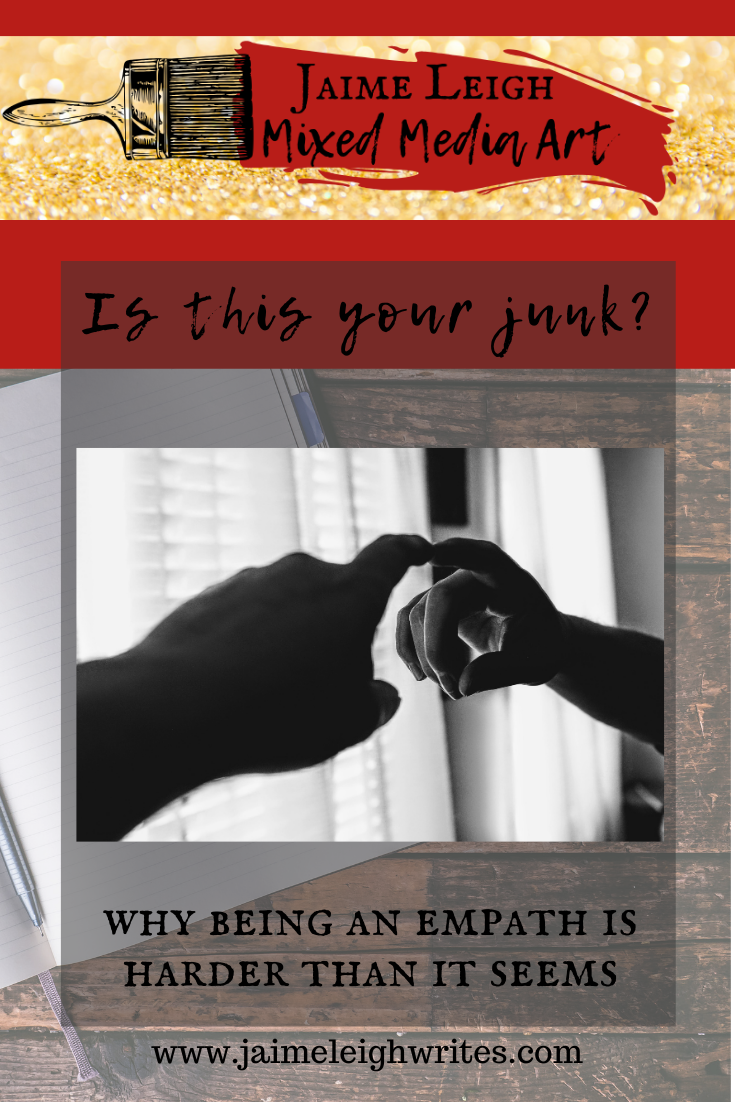How Being an Empath Can Affect You Without Your Knowledge!
Picture this: you’re having a good day.
Everything is going like it should. The only problem?
You feel irritated and don’t know why. You’re not sick, and don’t have a headache. Nobody pissed you off.
You did everything that needs to be done.
Even got the kids out of the house with (minimal) fighting this morning!
You know you have no reason to be irritated, which is why it feels so strange.
Then, you overhear your coworker on the phone in the cubicle next to you, talking to her husband. Earlier during break, she had shared a situation between them that was really bothering her. You talked with her and gave your input, and suggested a few ideas for how she could deal with it.
Later, she stops at your desk to offer thanks for helping her earlier. She called her husband and told him what was bothering her, and they made plans to continue the talk over a dinner date.
She says she feels so much better.
As she walks away, you suddenly realize something. The irritated feeling is gone.
What is going on? Is this a SciFi movie?
No, but there is an explanation.
If this type of thing happens to you often, you could be an empath.
How I Discovered I “Feel” Other People’s Feelings
I was feeling really “off” one day, and it confused me.
There was no reason that I could think of for having an off mood.
Nothing had happened. Nothing stressful was going on.
But still, I had the Jumbly Chest of Anxiety and felt really irritable and yet helpless at the same time.
Honestly, I was mystified. Generally, when I’m angry, frustrated, upset, or irritated, I know why.
But this almost felt like it was someone else’s upset. I felt it, but was also really disconnected from it.
Then, later that day, my daughter had a bit of a meltdown. She had been feeling stress and anxiety over a situation in her life, but didn’t know how to deal with it and was acting angry and upset about everything. Finally, we sat her down and it turns out the real situation was something she didn’t realize she was upset about – she just felt bad and was lashing out. After our talk, my feelings disappeared.
And I was really weirded out.
What kind of voodoo was this?
My Junk . . . Isn’t Always My Junk?
For a while, I took notice. When I felt sad, upset, off, or anxious I started to ask, is this my junk or someone else’s?
I was so startled to realize what I thought was my junk was often someone else’s.
Once I discovered who was feeling a certain way and why, my stuff would disappear. Often, I would go several hours and realize, hey, I don’t feel (insert bad feeling) anymore.
Now, I’ve learned that if I find myself saying or thinking, “I feel off,” but I don’t know why, that’s my cue to look at who is feeling that way.
I even came up with a term that I say to my fiancé so he knows I feel weird but it may not be me . . . I call it “bad mojo.” Somebody’s bad stuff, but not mine.
For a long time, I had no idea what it all meant. And I do admit that I felt like a weirdo about it.
But then I read about a type of person called an “empath. . .”
Are Empaths Really a Thing? Science Says . . . Yes!
There’s a lot of memes and shared information on social media about being an empath, but just like a lot of other popular things, in real life it isn’t always as fun and easy, or cool as the memes might suggest.
In fact, it’s often just the opposite.
Here’s the official definition of “empath:”
em·path
NOUN
- (chiefly in science fiction) a person with the paranormal ability to apprehend the mental or emotional state of another individual.
I love how the dictionary makes a point to say chiefly in science fiction. Trust me, it does feel a little science fiction-ish. But it also feels very real.
And so, partly to make sure I wasn’t crazy, I went looking for a scientific explanation of what an empath does. Because, you know – science.
One Explanation? It’s In Our Biology
I found an article on Psychology Today that explains one person’s take on the scientific information available on being an empath, The Science Behind Empathy and Empaths by Judith Orloff, M.D. The article outlines five body processes that in certain people are amplified and result in what we call “being an empath.” The 5 things are:
- Mirror Neurons – we all have brain cells that allow us to mirror someone else’s emotions, but in an empath this mirror neuron system is thought to be amplified.
- Electromagnetic Fields – Empaths are more in tune to the information they receive through the electromagnetic fields of the brain and heart.
- Emotional Contagion – The “contagiousness” of emotions, and how being around people with certain emotions affect us and lead us to “pick up” those emotions.
- Dopamine Sensitivity – Some people need less dopamine to be happy, and rely less on external stimulus to feel good.
- Synesthesia – This is a pairing of two senses (i.e. someone who “sees” music). In an empath, there is a pairing of touch and feeling, allowing the person to feel another person’s feelings.
Of course, different people will have different responses and reactions to these things, which is why some people are empaths, some are not, and different empaths have different ways of picking up on the emotions of others.

Empaths and Narcissists: Is There a Connection?
I also find it interesting that the term empath comes up a lot in information relating to dealing with a narcissist. In short, there are a lot of people who have gone through narcissistic abuse who are empaths.
Coincidence? I think not. Growing up, my salvation was being able to read people quickly and then disappear to keep myself from getting in trouble or being the target of misplaced wrath. It only makes sense that as an adult, my sense of what other people feel is more finely tuned than a person who didn’t grow up around a narcissist.
As a kid, I had to adapt to be able to stay steady in a swirling tornado of other people’s feelings (In my case, mostly yelling/anger). I got really good at being exactly the person I needed to be so I didn’t trigger any bad moods, conflict, upset, etc.
Now, that sense of saving myself when I’m in danger has given adult me a strong aversion to conflict of any kind. When someone else is in turmoil, I read the cues they’re giving off. Unfortunately, I still translate it a lot of times to mean, It must be something I did. Even if it wasn’t.
Is Being an Empath Really a Disorder?
Another bit of research I came across was from the article Sensory Processing Disorder: The Science Behind Being an Empath, by Paige Bartholomew on thespiritscience.net.
According to the article, the term “empath” is synonymous with Sensory Processing Disorder, or SPD. This disorder is characterized by parts of the brain not receiving or interpreting sensory information correctly (even though information is received normally from senses like seeing, hearing, taste, etc.).
People with SPD take in way more information than the average person – more colors, feelings, energy, noises. This makes total sense to me because when I am around a LOT of stimulation like a place crowded with people, or a place where too much is going on, I leave feeling a strange mix of drained and amped up.
From what I understand, Sensory Processing Disorder manifests in many ways, but they all come back to the senses. The way sense information is processed can result in excessively seeking certain stimuli – or excessively avoiding it. It really depends on the person. For example, people with SPD might either avoid or crave excessive touch, or avoid or crave experiences that heighten the senses.
I Discovered I Have Most of the SPD/Empath Behaviors!
There’s a great list of behaviors associated with SPD in the Spirit Science article. As I read down through them, I could easily pick out all the ones that apply to me:
- Touch: I am sensitive to touch. I have said for years, especially when I was a teacher, that I have my own personal bubble and I really feel uncomfortable when people invade that space.
- Dealing with life: I have trouble processing my emotions and dealing with challenges by myself, and I often need another person to be able to talk out loud through “stuff.”
- Negative emotions & situations: I am very sensitive to negativity.
- Leave me alone: I have to spend time alone to recharge, especially after being around people or chaos for any length of time.
- Eye Contact: I avoid direct eye contact, in fact, holding a gaze makes me extremely uncomfortable.

- Wanting peace: I constantly seek peace and calm, but always feel jumbled up and in turmoil inside. Like the article says, “the two don’t seem to match and it feels confusing.”
If you think you might be an empath/have SPD, take a look at the article and read through the list. Do you see yourself in the descriptions like I did? Honestly, it was almost comforting to read the examples and realize, there are other people who feel or act this way!
What do you think? Is being an empath a result of biological processes in our bodies . . . a disorder . . . a combination, or something else entirely? Are you an empath or do you know one? What made you (or them) first realize it? Leave me a comment, I’d love to hear from you!
Like this post? Check out another! Read Using Mixed Media Art to Cope
 Sources used:
Sources used:
https://www.psychologytoday.com/us/blog/the-empaths-survival-guide/201703/the-science-behind-empathy-and-empaths
thespiritscience.net/2015/08/09/sensory-processing-disorder-the-science-behind-being-an-empath/
- Art That Heals: The Mental Magic of Mixed Media - August 20, 2024
- The Fundamentals of Mixed Media Art: How to Create Art That Inspires - August 14, 2024
- From Chaos to Creation: 3 Experimental Mixed Media Painting Techniques to Try - June 24, 2024


